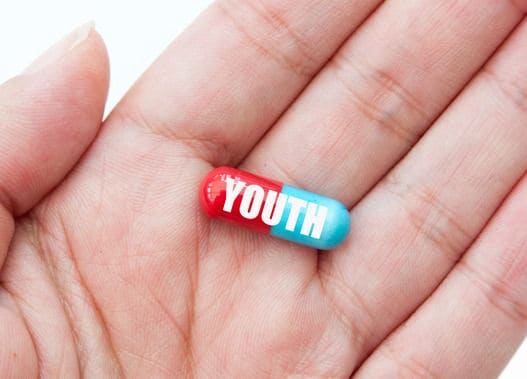

As we age, the need to care for our bodies becomes increasingly apparent. Caring for yourself likely encompasses a variety of things, such as seeing a physician regularly, exercising daily, eating well and getting plenty of sleep. Although, those interested in aging gracefully know that there is even more to maintaining wellness. By taking a broad spectrum multi-vitamin that is already fortified with antioxidants, folks can take an additional precaution for preventing the myriad of ailments known to accompany maturity.
Why Multi-Vitamins
A daily supplement that includes a broad selection of vitamins and minerals, multi-vitamins are a combination of nutrients essential for general health and well-being. As a complex facility requiring hundreds of simultaneous chemical reactions to function, our bodies need specific ingredients for each individual reaction. Unfortunately, deficiencies in any particular nutrient can impede these reactions and negatively impact human health. People who know about multi-vitamins fueling our body’s chemical reactions take them to increase their ability to function optimally and, thus, maintain wellness.
While true vitamin deficiencies are rare in the U.S., low or sub-optimal levels are very common. According to the authors of a study published in a June 2002 edition of JAMA – the Journal for the American Medical Association, sub-optimal intake of some vitamins, above levels causing classic vitamin deficiency:
- is a risk factor for chronic diseases
- is common in the general population, especially the elderly
These Harvard medical authors found that a majority of Americans do not consume an optimal amount of vitamins by diet alone. More specifically, their research showed:
- Low levels of folic acid, vitamins B6 and B12 are a risk factor for cardiovascular disease, neural tube defects and colon and breast cancer.
- Low levels of vitamin D contribute to osteopenia and fractures.
- Low levels of vitamins A, E and C increase the risk for several chronic diseases.
The authors concluded that it is prudent for all adults to take vitamin supplements.
Why Antioxidants?
Quickly emerging as a buzzword for defining healthy foods, antioxidants are naturally present in a wide range of fruit, vegetables, legumes, seeds, grains and some sources of protein. The opposite of oxidants, antioxidants are substances capable of counteracting the damaging effects of oxidative stress.
Oxidative stress occurs when free radicals attack healthy tissues in the body. Formed by a variety of normal biochemical reactions, a free radical is an electrically charged atom or group of atoms with an unpaired electron in its outermost shell. The unpaired electron makes a free radical unstable and highly reactive – ready to break apart nearby molecules to gain stability. This destructive potential is a known factor in damaging formerly healthy cells, proteins and DNA. Just as what can happen in the human body, the oxidative process is responsible for causing oils to become rancid, peeled apples to turn brown and iron to rust.
Antioxidants block the process of oxidation by neutralizing free radicals. Consisting of vitamins, minerals, enzymes and other unique substances, antioxidants are believed to play a role in preventing the development of many chronic diseases such as cancer, heart disease, stroke, Alzheimer’s, osteoarthritis, liver disease, autoimmune disease and cataracts.
While experts agree that getting antioxidants from food is ideal, most modern day Americans do not get enough from their diet. Thus supplementing with antioxidants provides additional wellness insurance. Some particularly potent antioxidants include:
- Vitamin C – Besides being one of the most well-known vitamins, vitamin C is also a highly effective antioxidant. Even in small amounts vitamin C can protect indispensable molecules in the body, such as proteins, lipids, carbohydrates, and nucleic acids (DNA and RNA) from damage by free radicals. Vitamin C may also be able to regenerate other antioxidants, such as vitamin E.
- Green Tea – Coming from the tea plant Camellia sinensis, green tea is rich in polyphenols, a type of antioxidant. According to John Weisburger, PhD, senior researcher at the Institute for Cancer Prevention in Valhalla, NY, green tea’s antioxidant power has about eight to ten times the polyphenols found in fruits and vegetables.
- Turmeric Root – Besides being a natural anti-inflammatory substance, turmeric is also a potent antioxidant. Perhaps because its main constituent (curcumin) helps make the body’s master antioxidant, glutathione, epidemiological studies of people who have a high dietary intake of turmeric show a lower incidence of cancer.
- Grape Seed – One of the best sources of oligomeric proanthocyanidins (OPC), grape seed extract is touted as a powerful antioxidant. Published online ahead of its printing in July 2011, a study in the journal Experimental & Molecular Medicine demonstrates just how valuable this antioxidant is. The researchers found that grape seed proanthocyanidin extract protected the joints against free radical damage and could be a viable osteoarthritis preventative.
These four antioxidants represent a small sample of the thousands of beneficial, free-radical neutralizing compounds.
Although we rarely view our body as a chemical factory, this perspective offers us a rare glimpse of how the substances we ingest can directly impact our health. By taking a daily multi-vitamin and combining it with a range of potent antioxidants, people can provide their bodies with the materials needed to keep them healthy – a recipe enabling humans to age that much more gracefully.




